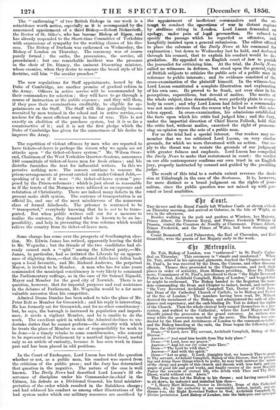• In the Court of Exchequer, Lord Lucan has tried
the question whether or not, as a public man, his conduct was sacred from the criticism of the public press ; and the Jury has determined that question in the negative. The nature of the case is well known. The Daily News had described Lord Lucan's ill ob- servance of discipline under his Commander-in-chief in the Crimea, his defects as a Divisional General, his fatal misinter- pretation of the order which resulted in the Balaklava charge ; and had adduced his eonduct as among other illustrations of the bad system under which our military resources are sacrificed by
the appointment of inefficient commanders and the at- tempt to conduct the operations of war iu distant regions by civilians sitting in London. Lord .Lucan demanded an apology, under pain •of legal prosecution. He refused to specify the passage which he regarded as offensive, and haughtily insisted upon a general submission. The editor offered to place the columns of the Daily News at his command for explanation ; but down to Wednesday last he held, and declared through his counsel, that to explain his conduct would be de- gradation. He appealed to an English court of kw to punish the journalist for criticizing him. At the trial, the Daily Yews called no witnesses in -defence, but stood upon the general. right of British subjects to criticize the public acts of a public man in reference to public intereats ; and its evidence • consisted of the cross-examination of the plaintiff himself. In the witness-box Lord Lucan constituted a complete illustration and explanation of his own case. He proved to be frank, not over clear in his perceptions, supercilious, but •devoid of malice. The merits of the whole subject, thus dramatized, were perfectly plain to every- body in court ; and why Lord Lucan •had failed as a commander was not more obvious than the reason why he had made this mis- taken appeal. In cross-examination, his admissions established the facts upon which his critic had judged him ; and the Jury, under the impartial direction of Chief Baron Pollock, held that the critic had, without malice, exercised the right of pronoun- cing an opinion upon the acts of a public man.
For us the trial had a special interest. Our readers may re- member that we too criticized Lord Lucan, on very similar grounds, for which we were threatened with an action. Our re- ply to the threat was to restate the grounds of our judgment with greater fulness and emphasis. Lord Lucan has compelled the Daily News to make that restatement in court : the verdict on our able contemporary confirms our own trust in an English jury, properly instructed by counsel and guided by the presiding judge. The result of this trial to a certain extent reverses the deci- sion at Edinburgh in the case of the Scotsman. It is, however, far more distinct as a broad judgment on the rights of jour- nalism, since the public question was not mixed up with per- sonal or local acerbities.
































 Previous page
Previous page